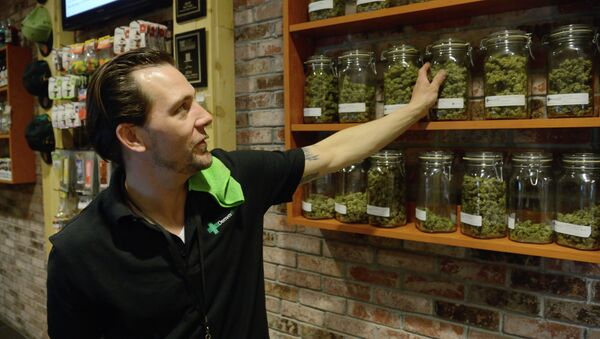MOSCOW, December 19 (Sputnik) — The recent lawsuit of Nebraska and Oklahoma versus Colorado over concerns of the latter’s legal cannabis production spreading far outside its state boundaries has sparked an acute discussion over the commercial prospects of the $2.3 bln US legal cannabis industry.
Now, the concerns of Colorado’s neighboring states are reasonable. The legalization of marijuana for recreational purposes, allowed in the Centennial State since January 1, 2014, has already created a booming industry, attracting an ever-growing pool of customers, creating jobs and offering high profits. If this industry is to grow it must expand outside of Colorado, as it needs more markets in accordance with the laws of capitalism. Colorado cannabis market is estimated to have created over $600 mln in total revenues this year, as reported by Entrepreneur. Selling weed statewide also brings fiscal benefits, with cannabis dispensaries in Colorado having paid $67 mln in taxes this year.
Nebraska and Oklahoma will hardly succeed in containing the triumphalist march of weed legalization across the USA, as their judicial initiative contradicts the spirit of the market economy, which is America’s cornerstone value. Market observers, namely ArcView Market Research, say the legal weed industry, having reached $2.3 bln in total earnings this year, will expand to $10.2 bln by 2018.
"A majority of Americans favor legalization, and there is overwhelming support among younger voters," William McGrath of Washington, DC-based Potomac Law Group told Entrepreneur.
In New York state, where only limited use of weed – ‘for medical purposes’ – is legal, profit margins reached 30% to 45% in 2012, with one square foot of shopping space generating $3,500 to $5,000 in revenues, according to the Guardian. In comparison, Apple stores made roughly $4,650 in revenues per one square foot, and Tiffany & Co. made some $4,221, both in 2013. Moreover, the industry is expected to bring about $200 mln in taxes.
The legal production and distribution of cannabis in different states is also very appealing to investors. In New York, the legislation provides that licensed businesses must grow, harvest, process and sell their product within the ‘seed to sell’ principle, meaning they have to employ a lot of personnel, buy or rent greenhouse premises, invest in fertilizers, spend on utilities, etc. Such a full-circle business requires substantial investment, and as long as commercial returns are good, a sufficient investment is usually in place. However, financial institutions and credit cards are subject to federal regulations, and the federal government prohibits weed. This is where private incentive steps forward.
At present, private money has slowly flowing into New York’s legal weed industry. Terra Tech also has business enterprises in Nevada, spends “hundreds of thousands of dollars” obtaining licenses, and even hired Sen. Harry Reid’s son as a lobbyist.
Another company, involved in the production and sale of the substance, California-based MedMen, is one of the most successful examples in the nationwide industry. This November, MedMen announced they raised $3.75 mln from investors in an unofficial IPO of sorts, as reported by Fortune. Some of their investors hail from as far as Florida, where weed is prohibited and not even decriminalized. But the people there are interested in securing a stake in the future sky-high dividends the growing industry promises.
“Institutional capital has been circling for a year now, but they’ve just been circling,” Adam Bierman, cofounder for MedMen said. Big investors are still avoiding companies that “touch the plant,” as major investors still see it as a taboo narcotics business. Similar trends are seen north of the border, in Canada, where a Moncton, NB-based medical weed company, OrganiGram, raised $40 mln of initial investment in an IPO on the TSX Venture Exchange stock index. OrganiGram’s shares quickly tripled in value, to $120 mln this past August.
The US federal government should probably consider at least decriminalizing cannabis so legitimate companies south of the Canadian border can legally participate in financial markets.
All in all, the main issue vis-à-vis the legal production and sale of weed in the US is the conflict between federal legislation, which sees weed as an illegal controlled narcotic substance, and the laws of several individual states that consider cannabis a marketable goods. There is no doubt capitalism will prevail; sooner or later Washington will decriminalize the weed business, but as time passes by, a lot of money is lost due to formal restrictions.



